Reviews for April 17th, 2009
17 Again
Directed by Burr Steers.
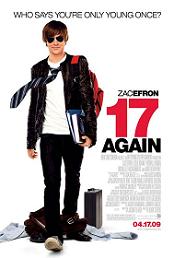
In 1989, 17-year-old Mike O’Donnell (Zac Efron), a high school senior, has a basketball scholarship and plays on the school’s varsity team. When his girlfriend, Scarlet (Allison Miller) informs him that she’s pregnant, he walks right off the court of an important game, throws away the pursuit of his dream of becoming a basketball star, and marries her instead. 20 years later, Mike (now played by Matthew Perry) lives in a suburban home with his two teenage kids, Maggie (Michelle Trachtenberg) and Alex (Sterling Knight), has a mundane job as a salesman at a pharmaceutical company. To top it all off, he has lost he and his wife, Scarlet (now played by Leslie Mann), have lost their romantic spark and she’s now in the process of divorcing him. He visits his old high school where his children now attend and, soon after bumping into a mysterious janitor (Brian Doyle-Murray), he falls into a vortex that magically transforms him back into his 17-year-old self. His best friend, Ned (Thomas Lennon), a sci-fi nerd obsessed with The Lord of the Rings, initially has a hard time believe that he’s actually Mike, but eventually believes him and pretends to be his dad in order to enrol him at the high school where he gets another chance to follow his dream. Mike also gets to know his son, Alex, who has no idea that he’s actually his father, and confronts the bully, Stan (Hunter Parrish), who has been tormenting Alex and happens to be dating Mike’s daughter, Maggie. He also eventually gets to know Scartlet and has some awkwardly funny interactions with her. Meanwhile, Ned desperately tries to get a date out of the school’s sexy high school principal (Melora Hardin) no matter how many times she rejects him. Although the plot sounds convoluted and could have easily turned into a silly mess, it actually becomes quite delightful, hilarious and sweet thanks to its terrific, lively cast who all seem to be having a lot of fun in their roles. It’s especially amusing to watch Zac Efron give a charming, convincing performance as Mike, balanced by the comic energy of Thomas Lennon as Ned. Zac Efron radiates more charisma than the majority of young actors today. The screenplay by Jason Filardi combines comedy with just the right amounts of drama and romance. Fortunately, the humor rarely turns silly, inane or too mean-spirited. Sure, a lot of what happens to Mike can be considered as predictable, but that predictability doesn’t actually take away from the overall entertainment value of the film. Director Burr Steers, who wrote and directed Igby Goes Down, knows how to let each actor and actress shine while moving the pace briskly enough so that there’s rarely a dull moment to be found. At an ideal running time of 98 minutes, 17 Again manages to be a delightful, crowd-pleasing comedy radiating with a charismatic performance by Zac Efron. It’s pure, undiluted fun. Number of times I checked my watch: 1. Released by Warner Bros. Pictures. 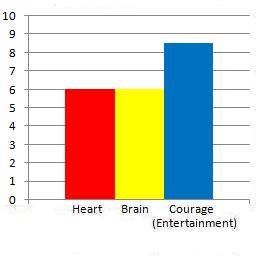
American Violet
Directed by Tim Disney.
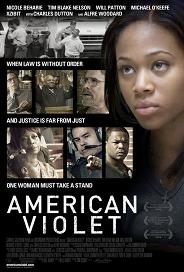
Based on a true story. Dee Roberts (Nicole Beharie), an African-American mother of four children, lives in a small Texas town with a predominantly black population. When policemen raid different sections of the town, they round her up along with a bunch of other suspected drug dealers, separate her from her kids and take her to prison even though she claims to be innocent. She rejects a deceptive plea bargain that would require her to plead guilty immediately in order to be set free with reduced penalties, thereby avoiding a fair trial. Gladys (Pamala Tyson), another inmate at the prison, takes the easy way out by accepting the plea bargain. Instead, Dee wants to stick to her principles and insists that she’s not guilty. Once released from prison, she can’t get back her waitressing job and finds it difficult to get hired elsewhere, yet, she feels determined to stand up for justice and to expose the police’s immoral brutality and racism that has been going on for many years. David Cohen (Tim Blake Nelson), an ACLU attorney, along with co-lawyer Byron Hill (Malcolm Barrett), tries to help her to win the seemingly daunting case against the powerful, racist and smarmy district attorney, Calvin Beckett (Michel O’Keefe). Through his eloquent words of wisdom, Byron convinces Sam Conroy (Will Patton), a former narcotics officer with good connections within the town, to be on their side. Meanwhile, there’s a subplot involving Darrell Hughes (Xzibit) one of the fathers of Dee’s children, who tries to get back his children with physical force. Despite solid performances, especially by Nicole Beharie and the underrated Tim Blake Nelson, the dramatic tension often feels contrived. Screenwriter Bill Haney does a great job of developing Dee’s character so that you care about her, understand her and root for her to win, but the way that the interactions between her lawyers and the district attorney unfold simply come across as too rushed and unconvincing. Why not develop some of the other characters, such as Byron or Calvin, besides Dee a little more so that they would come to life? Instead of briefly referring to it on a videotape recording, why not actually show the scene where Byron convinces certain key witnesses to give testimonies to prove Calvin’s racist intent? Had the screenplay taken its time to organically and realistically develop its many interesting themes it would have been much more powerful and engrossing. As such, though, American Violet has solid performances that make it moderately compelling, but its weak screenplay merely simmers the provocative, initially intriguing issues of racial prejudice, police corruption and unjust laws without bringing them to a palpable boil. Number of times I checked my watch: 3. Released by Samuel Goldwyn Films. 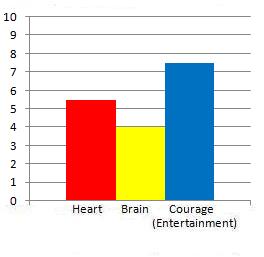
Every Little Step
Directed by Adam Del Deo and James D. Stern.
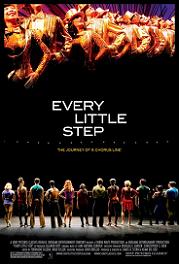
This lively, but unenlightening documentary follows dancers as they audition for the 2006 revival of “A Chorus Line” on Broadway. Michael Bennett had directed and choreographed the original production which debuted on Broadway back in 1975. The show itself is about a group of dancers who audition to be cast in a production, so everyone who auditions for “A Chorus Line” can relate to their role to some degree. Co-directors Adam Del Deo and James D. Stern spend too much time showing the audition processes and reactions of the dancers, all of whom seem quite talented and passionate about dancing while they’re also quite nervous, obviously. Some of them give more energetic and authentically moving dance/singing performances than others. If you’re interested in learning about how Michael Bennett had come up with the original idea for “A Chorus Line”, you’ll get a little insight about that in audio recordings and archival footage with interviews, but those, along information with Michael Bennett’s life and career, could have easily been fleshed out more to add some well-needed insight. Who among the dancers will you root for? Does it really matter? The interviews with the dancers don’t really delve deeply into their backgrounds or what inspires them to become Broadway dancers begin with. It’s somewhat suspenseful and engaging, though, to watch them auditioning and waiting to see if they’ll be told to come back for another round of audition or not. You get glimpse of how the director and casting director of show react to the auditions and discuss what they liked and didn’t like. However, there’s still the overarching question that remains unanswered: “So what?” A truly great documentary ought to find the right balance between entertaining the audience and provoking them intellectually and emotionally, which isn’t an easy task, but it’s still an important one which the documentary doesn't quite acheive. Every Little Step manages to be mostly entertaining, lively and occasionally riveting and moving, but its lack of insight and provocative revelations ultimately leave you feeling underwhelmed. Number of times I checked my watch: 3. Released by Sony Pictures Classics. Opens at the Angelika Film Center, Clearview Chelsea and Lincoln Plaza Cinemas. 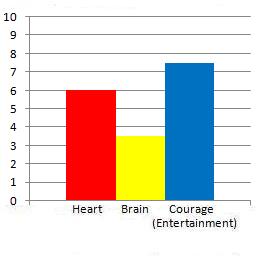
Gooby
Directed by Wilson Coneybeare.
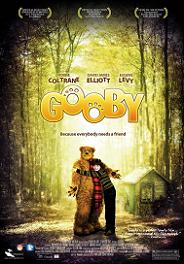
When 11-year-old Willy Dandridge (Matthew Knight) moves into a new suburban home with his mother, Elize (Ingrid Kavelaars) and father (David James Elliott), he believes that pernicious space aliens reside in the house, so he often gets frightened. He’s socially outcast at school, hasn’t made any friends and has a vivid imagination which explains why he thinks he’s seeing all sorts of creatures popping up every now and then. One of those creatures happens to be a giant teddy bear, Gooby (voice of Robbie Coltrane), who’s much more friendly than he looks. Essentially, Gooby seems cuddlier, gentler and shorter than Harry from Harry and the Hendersons. Eugene Levy briefly shows up for comic relief as Willy’s goofy middle school teacher. Neither of Willy’s parents is able to understand him and reach out to him emotionally like his new friend, Gooby. Will Gooby help Willy to overcome his loneliness and fears? Sure, the screenplay by Wilson Coneybeare has plenty of clichés as well as predictable and contrived moments, but that doesn’t make the film any less entertaining for kids. Adults, though, will probably have the urge to roll their eyes a lot at how cartoonish, silly cheesy a lot of the situations and characters seem, but kids would be able to easily overlook all of those flaws or treat them as minor. It’s quite uplifting to watch as Gooby brightens Willy’s life up in many ways, helps him to connect to the world around him and, most importantly, to cherish and get closer to his own family. That giant teddy bear represents many important, life-affirming qualities including courage, growing up, happiness, comfort and, above all, a sense of hope. At a running time of 99 minutes, Gooby manages to be entertaining for kids while slightly corny and silly for adults, but it’s often harmless, bighearted and filled with inspirational messages about friendship, hope and the importance of family which everyone, young and old, can appreciate. Number of times I checked my watch: 3. Released by Monterey Media. 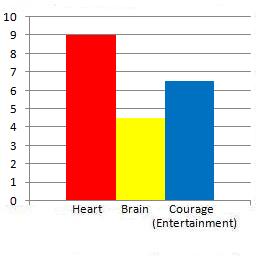
Lemon Tree
Directed by Eran Riklis.
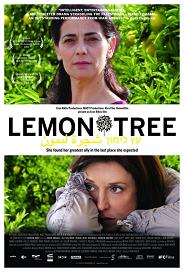
In Arabic, Hebrew and French with subtitles. Salma Zidane (Hiam Abbass), a Palestinian widow, lives in the West Bank town of Zur HaSharon. Her house has a lemon grove in its backyard that happens to be directly in front of the West Bank-Israel border. When Israel Navon (Doron Tavory), the Israeli Minister of Defense, moves with his wife, Mira (Rona Lipaz-Michael), into a new house on the other side of the border, he considers Salma’s lemon grove as a security risk because potential terrorists could hide there, so he threatens to uproot it. Not only does the grove produce lemons that make for great lemonade and help to provide a living for Salma, but it has sentimental value for her as well. It has been around ever since her grandfather had worked hard planting and taking care of it with his bare hands just like she has been doing for many years. Even while she’s prohibited to enter the grove and its lemon trees start dying, she continues to fight for the right to keep her precious lemon grove. She convinces a young lawyer, Ziad Daud (Ali Suliman), to help her with the case and, soon enough, in a somewhat contrived subplot, they both form a friendship that briefly turns into a May-December romance. She also develops an interesting, yet subtle relationship with Mira, Israel’s wife, who observes her silently at the grove, makes eye contact and gradually feels more compassion for her. The underrated Hiam Abbass shines in an emotionally raw performance as Salma that radiates with plenty of warmth, charisma and tenderness which keeps you thoroughly immersed and engaged in the compelling drama. Director/co-writer Eran Riklis does a great job of humanizing Salma so that you truly empathize with her and care about the intense ordeal that she goes through, especially during the equally poignant and suspenseful courtroom scenes. At a running time of 106 minutes, Lemon Tree manages to be a genuinely absorbing, compelling and wise drama with a well-nuanced, radiant and moving performance by Hiam Abbass, the heart and soul of the film. Number of times I checked my watch: 1. Released by IFC Films. Opens at the IFC Center and Lincoln Plaza Cinemas 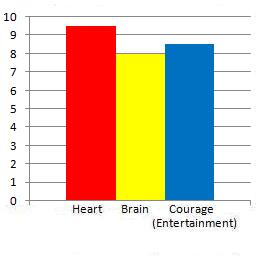
Perestroika
Directed by Slava Tsukerman.
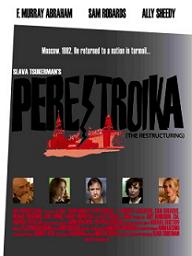
Sasha Greenberg (Sam Robards), a Jewish astrophysicist, has spent the last seventeen years in the United States working for the U.S. military. He returns to his native country, Russia, where’s invited to give a speech about the universe at the Congress on Cosmology conference in Moscow. He has lost the romantic spark with his wife, Helen (Ally Sheedy), who comes to Russia with him. Once he arrives, he’s forced to confront his past in more ways than one while struggling to assimilate in a country that’s no longer the same socially, politically or economically. Natasha (Oksana Stashenko), a woman who had been in love with before his emigration, re-enters his life along with another former lover, Jill (Jicky Schnee), who’s now an environmental documentarian. The plot gets slightly more complicated when Sasha learns that he may or may not be the father of Natasha’s sixteen-year-old daughter, Elena (Maria Andreyeva), whom he happens to flirt despite that possibility. F. Murray Abraham adds some gravitas as Sasha’s mentor, Professor Gross. Sasha also learns that a lot has changed in Russia throughout the last seventeen years that he had spent away from his homeland. Crime has risen and its there’s a general sense of unease there ever since Mikhail Gorbachev had initiated the country’s restructuring, a.k.a. “perestroika,” back in 1986. The screenplay by writer/director Slava Tsukerman, who also wrote and directed Liquid Sky, shifts back and forth between the present scenes and flashbacks to 1970’s when Sasha’s wife, Helen, helped him to emigrated from Russia. These shifts in chronology often distract from the film’s dramatic momentum, especially given some awkward and abrupt transitions which makes the plot seem convoluted and confusing. Tsukerman uses stylish cinematography that includes cheap CGI backgrounds that makes for a dreamlike effect and, therefore, diminishes the realism. When it comes to the performances, some are convincing, like those of F. Murray Abraham and Sam Robards, while others feel wooden or mediocre at best. There’s also some poor dubbing of Russian actors who Sasha meets, which gets rather irritating to watch and to listen to. At a running time of 97 minutes, Perestroika has stylish visuals and a provocative, imaginative screenplay, but occasionally drags and feels convoluted with too many irritatingly awkward moments that lack an emotional core. Number of times I checked my watch: 4. Released by REF Productions. Opens at the Cinema Village. 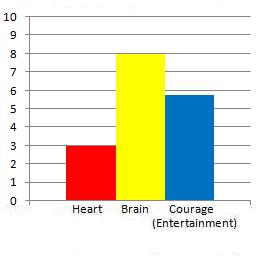
State of Play
Directed by Kevin Macdonald.
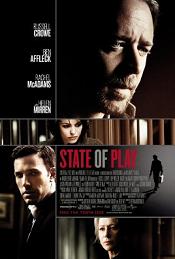
Based on the BBC television miniseries created by Paul Abbott. Cal McAffrey (Russell Crowe), a reporter for the Washington Globe, investigates the possible connections between the recent killing of two men and an apparent suicide of Sonia Baker (Maria Thayer), who worked as an aide for U.S. Congressman Stephen Collins (Ben Affleck). The newspaper’s editor, Cameron Lynne (Helen Mirren), wants him to find something meaty for an article which would help to boost the Washington Globe's waning sales, so she assigns a blogger, Della Frye (Rachel McAdams), to help him put the pieces of the puzzle together and to uncover the truth. When Cal discovers that Sonia was involved in an affair with the married congressman, the plot quickly thickens as do the twists and turns. He and the congressman were college roommates back in the day, so Cal tries his best to maintain their friendship while digging for more information from him. In a slightly contrived subplot, he bonds with Stephen’s wife, Anne (Robin Wright Penn), with whom he had once been romantically involved. Who can Cal and Della trust? Will they be brave enough to put their lives and careers on the line to get to the bottom of Sonia’s suspicious death? Co-writers Matthew Michael Carnahan, Tony Gilroy and Billy Ray do a decent job of building suspense by not revealing too much information early in the film. You, as member of the audience, know as much about Sonia’s case as Cal and Della know, so when they learn something new, it’s equally surprising for you as well. Russell Crowe delivers a strong performance as Cal, whose courage, intelligence, passion as a journalist and palpable hunger for the truth make him into a very interesting character worth rooting for. The underrated Rachel McAdams seems a bit underused here, though, so it would have been helpful to flesh out her character a bit more along the way. As always, Helen Mirren gets some of the sharpest, juiciest and funniest lines and steals the brief, yet integral scenes that she’s in. Director Kevin Macdonald includes a few nods to other political thrillers, such as All the Presidents Men and even a brief nod to The Godfather. The fast pace, stylish editing along with the well-chosen musical score all help to enhance the intense mood of paranoia as the plot becomes more and more intricate. During the third act, though, it loses a bit of steam and excitement once truth finally emerges, which won't be spoiled here. It’s consistently interesting, though, to observe the evolving dynamic between Cal and Stephen throughout the film. Ultimately, State of Play isn’t as intelligently woven or rewatchable as last year’s superb murder mystery, Tell No One, but at least it has solid performances and enough surprises, thrills and tension to keep you at the edge of your seat.Number of times I checked my watch: 2. Released by Universal Pictures. 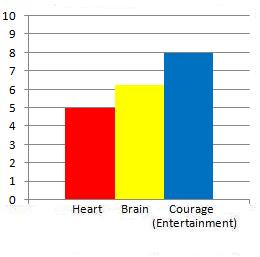
Vienna’s Lost Daughters
Directed by Mirjam Unger.
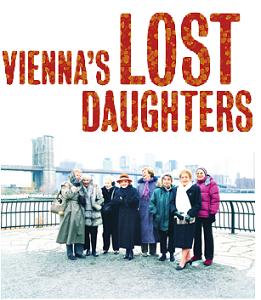
In German and English with subtitles. This poignant and captivating documentary focuses on the lives of eight Jewish women who had fled Nazi persecution in Vienna, Germany during the late 1930’s. Five of the women, namely, Eva Franzi Yachnes, Anita Nagel Weisbord, Alice “Lizzy” Winkler, Susanne Perl and Hennie Edelmann, had parents who sent them away via train to Europe through the Kindertransport rescue mission. Rosalie Berezow and Dorit Bader Whiteman fled to Europe as well while Susy Orne fled to New York City. Each of them eventually ended up in New York City where they moved on with their lives and settled down, some with their husbands, children and grandchildren. It’s amazing and uplifting how they each have joie de vivre along with warmth and a sense of humor to go with it. However, Alice Winkler wisely says, the pain of their horrific experiences that they went through in Vienna has gone away and the wound has healed, but the scars are still there. Director Mirjam Unger does a terrific job of showing what these eight women are like nowadays in their senescence while gently inquiring about those scars without dwelling too much on them. They discuss their memories about Vienna, what it was like to go back to visit it, and how they adapted to life in New York City. Dorit Whiteman often plays tennis while others such as Eva Yachnes, practice yoga. They each have found their own ways of achieving contentment in life while spreading to younger generations the valuable lessons and wisdom that they attained throughout their experiences. It’s particularly interesting to listen and to observe how the younger generations react to their mother’s or grandmother’s experiences leaving Vienna during their childhood. At an ideal running time of 87 minutes, Vienna’s Lost Daughters is filled with warmth, humor, tenderness and insight. It ultimately finds just the right balance between entertaining the audience and provoking them intellectually as well as emotionally. Number of times I checked my watch: 0. Released by AUTLOOK Filmsales and MOBILEFILM Produktions. Opens at City Cinemas Village East 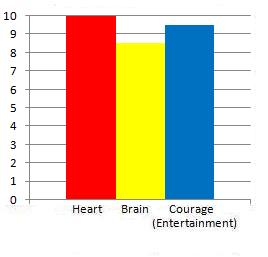
Main Page
Alphabetical Menu
Chronological Menu
______________________________________________________
|
















